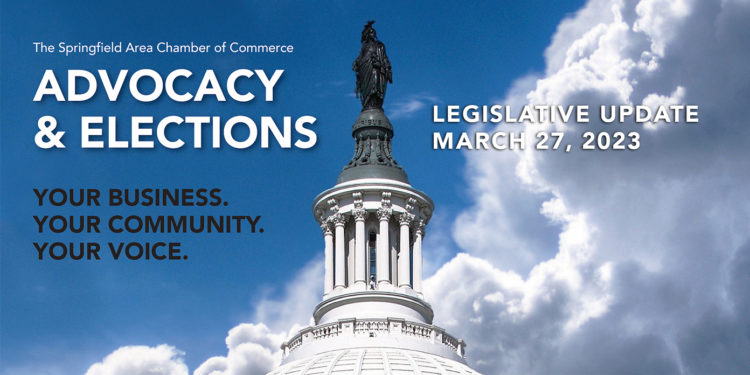Legislative Update: March 27, 2023

We’re monitoring Oregon’s 2023 legislative session for issues of impact and interest to our members. Here’s the latest update from our legislative counsel at the Oregon State Chamber of Commerce (OSCC).
The major event of the past week was the unveiling of the state budget by the legislature’s chief budget writers.
Both the Governor’s budget and legislature’s budget prioritize the same things – additional state spending for homelessness and housing, behavioral health, and education. Both the Governor and legislature agree on a $9.9 billion budget for K-12. Neither the Governor nor legislature are proposing any new taxes or revenue increases. However, there are some key differences in the approach.
Governor Kotek’s budget, which she unveiled on February 1st, called for about $32 billion in spending with about $31 billion in available revenues. The Governor made up the difference by transferring just shy of $1 billion from money that was slated to go into the state’s Rainy Day Fund.
The legislative budget proposal appears to use no monies from the Rainy Day Fund. Instead, legislative budget writers want agencies and programs to find 2.5% reductions in their current service level budgets in order to create disposable income to fund efforts to keep Oregonians on the Oregon Health Plan who would otherwise not qualify any longer due to the expiration of the public health emergency.
It is very likely that budget writers are holding back until the May revenue forecast to make any decisions about using state reserve funds. If Republicans want additional spending to fund their own priorities, then Democrats will have leverage to compel a bipartisan vote to keep some of the state’s reserve funds. It is unlikely that Democrats will want to shoulder that vote on their own.
The vast majority of concerning bills that OSCC is working on are still alive, including:
Employer Liability for Workplace Bullying (SB 851): If SB 851 were to pass, Oregon would be the first state to impart liability on employers in such a significant way, including a private right of action against an employer when an employee feels slighted or when they may disagree with a disciplinary decision that was made.
Expanded Right to Refuse Dangerous Work (SB 907): SB 907 includes an expanded right to refuse work for reasons including heat, cold, equipment, chemicals, animals, etc. SB 907 also allows employees who refuse work to take paid sick time to compensate for those hours.
Mandatory Pay Disclosures for Job Postings (SB 925): SB 925 would require employers to disclose pay range and employment benefits within a job posting or for a promotion. Failure to do so would subject an employer to a lawsuit or employment claim. OSCC has serious concerns about the new liabilities.
Expanded age discrimination liabilities (HB 2800): HB 2800 introduces complexity and confusion into Oregon’s existing age discrimination laws by compromising employers’ ability to consider experience and by requiring employers to bear burden of proof that age discrimination did not take place for adverse employment decisions.
Elimination of Natural Gas in Residential Housing (HB 3152): HB 3152 phases out the use of natural gas in the residential housing sector. It prevents line extension allowances for new gas line extensions that support the use of gas in residential buildings.
First party lawsuits on insurance claims (HB 3242 and HB 3243): Allows policy holders to sue their insurance companies for bad faith. These bills have been tried in other states and have benefitted few but resulted in significant premium spikes in commercial policies for all.
DEQ Title V permit fees (HB 3229): This bill is a massive 80% increase in Title V air emissions fees implemented by DEQ. Will hurt local manufacturers as permit costs are increased to save DEQ regulator positions. The bill also allows DEQ to raise additional fees without legislative approval.
Other bills still alive the OSCC supports include:
Increased estate tax exemption (HB 2426): Legislators are starting to express concern that Oregon’s estate tax is being levied on middle income Oregonians due to high real estate values.
Increased CAT Tax exemption (HB 2433 / SB 127): OSCC continues to be optimistic that a solution can be found that would increase the CAT tax threshold to as high as $5 million from the current level of $1 million.
Hiring and Retention bonuses (HB 3205): This bill would allow employers to begin to offer hiring and retention bonuses again as current state pay equity laws have made these bonuses legally tenuous.
The next major session deadline is April 4th. Any bill not voted out of committee by the end of Tuesday, April 4th is considered dead. This deadline is really the most important of the session because it determines the playing field for the second half of the legislative session.
The Springfield Chamber of Commerce will be publishing the OSCC’s legislative updates weekly, or as received. Any opinions expressed or implied are those of OSCC and do not necessarily reflect those of the Springfield Chamber or its representatives. If you’d like more information, please visit our Advocacy & Elections Page.
Discover more from Springfield Bottom Line
Subscribe to get the latest posts sent to your email.





